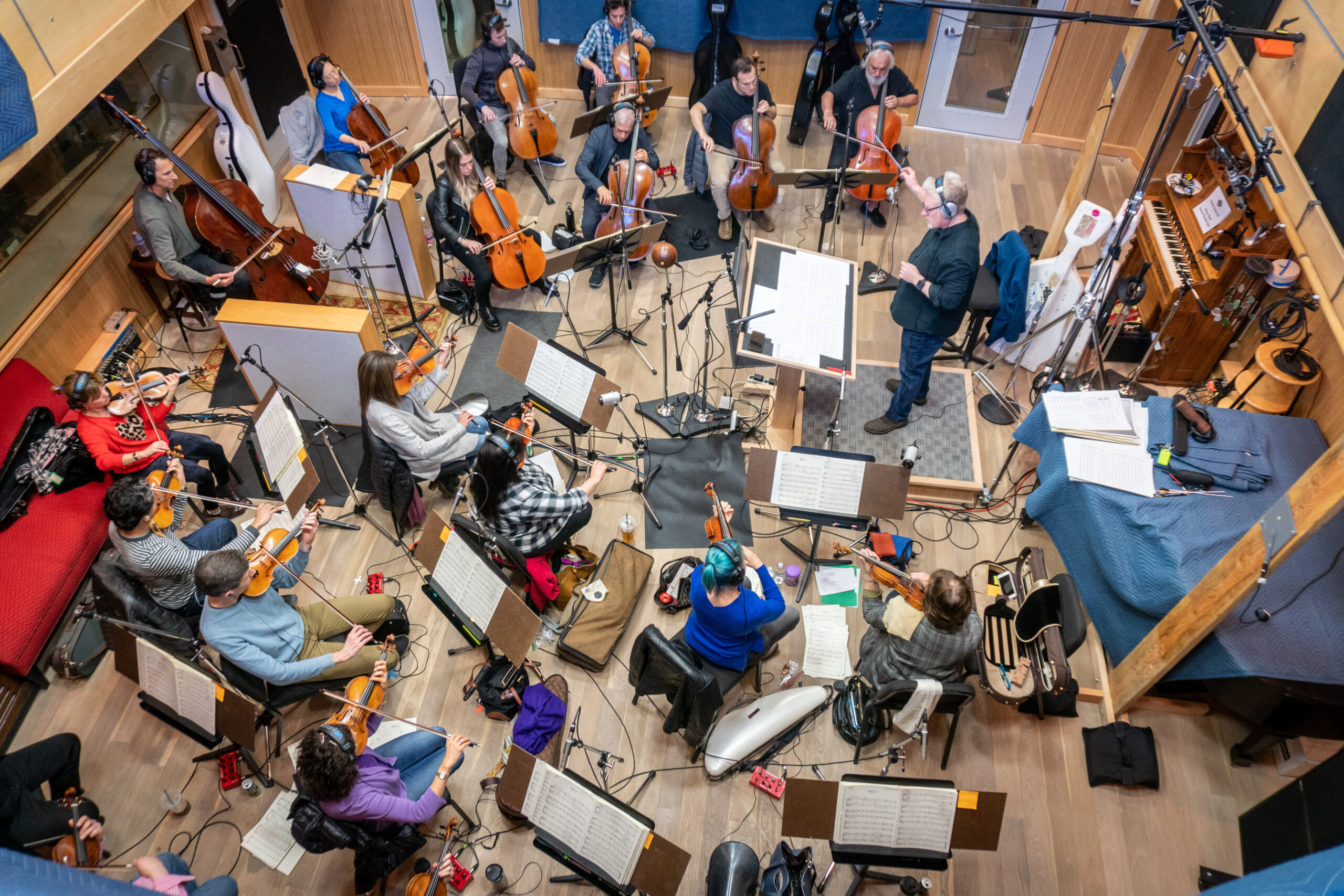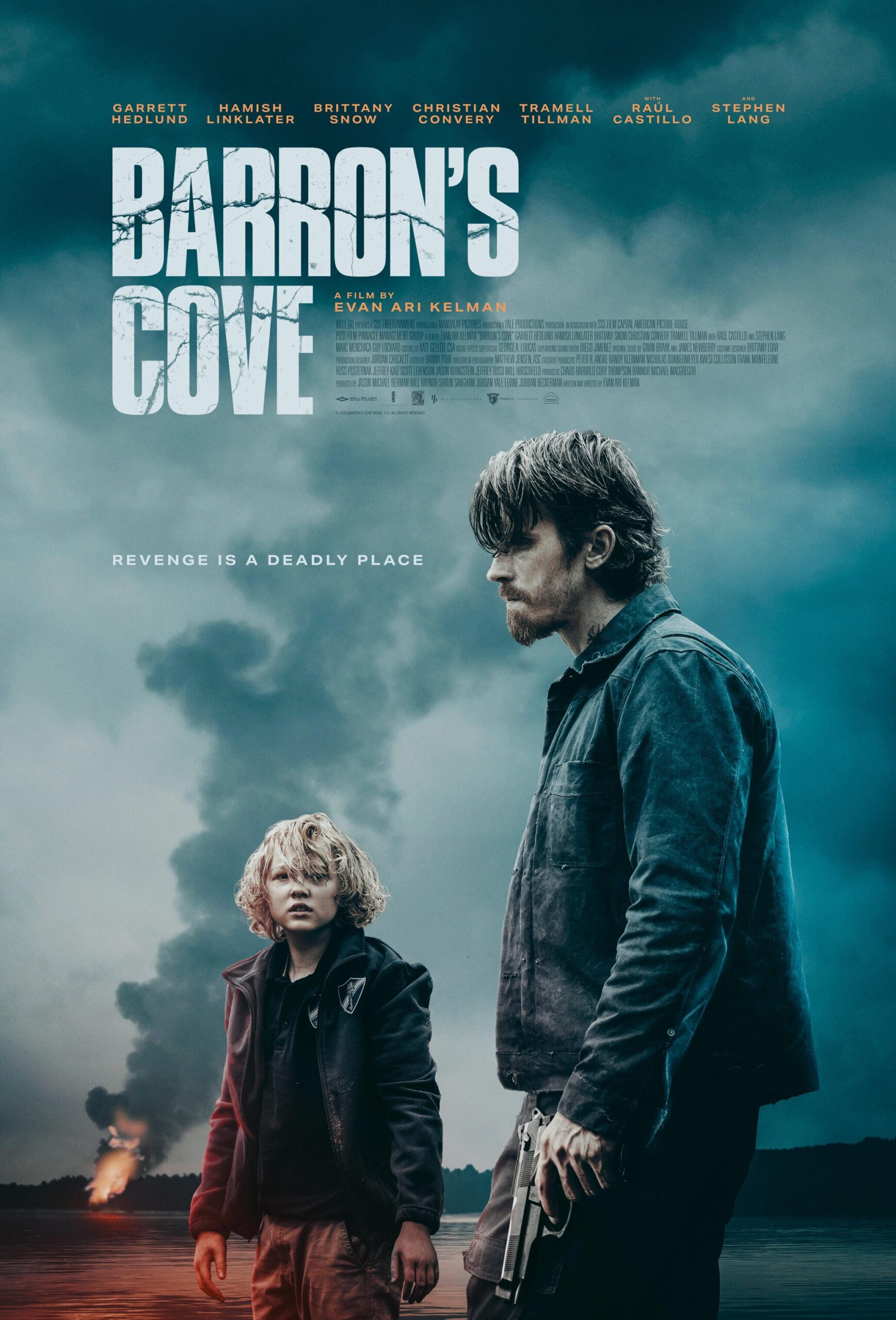An anger-filled melodrama with a punch, “Barron’s Cover” is awash in grief and toxic masculinity to powerhouse indie effect. Recalling the tortuous truth-telling likes of “Prisoners” and the townie tragedy of “Mystic River,” writer-director Evan Ari Kelman’s impressive feature debut has the recovering rageaholic dad Caleb (a knockout Garrett Hedlund) go on the rampage to find out what caused the horrific death by train of his son, with all signs pointing to a Damien-worthy kid (“Sweet Tooth’s Christian Convery) who’s PR candy for his connected politician dad (“Midnight Mass’” Hamish Linklater). When Caleb kidnaps the tween, it sends the wannabe senator running to town’s corrupt contractor (Stephen Lang at his muscularly menacing best), the town kingpin who just happens to be the uncle of his catastrophically bereaved fixer.
Providing a veritable sea of emotionally anguished atmosphere is the composing team of Gavin Bivrik (“How to Blow Up a Pipeline,” “The Pitt”) and James Newberry (“The Stroll,” “Catching Lightning”). While it’s antihero Caleb might be raging, Bivrik and Newberry keep the music at a hypnotic even keel. It’s an anguished whisper to the bereft screams, using metallic textures, gut-wrenching percussion and most of all poignancy that ultimately cuts through the anger to perceptively gets inside of an unlikely bond between two seeming psychopaths, hearing something all too human inside. Using subtlety as a poignantly blunt instrument, Bivrik and Newberry have a darkly lyrical synergy to their work that add to the captivating and suspenseful power of “Barron’s Cove.”


James Newberry
Tell us about what led you to music, and composing?
Gavin: I initially started off as guitarist, writing music for the bands I played in. When I went to college for classical and jazz guitar, I injured my wrist and was unable to play guitar for a few years. I then explored other music majors and found composition, which felt like my true calling.
James: I was really into film music all my life and I finally had a professor who noticed that while I was in my undergrad in Cleveland. Dr. Baumgartner was his name and he would give me scenes to score to learn. Then I started writing music for film students in Cleveland and eventually New York. I made a lot of relationships there and still work with many of those directors.
What brought you together as composers?
We both have very complimentary styles and intuitions. I think where one of us has strengths, the other has weaknesses. Our strengths are in different places and combined make one super composer, or as we like to say, ultra mega composer.
Tell us about your initial short work on “Cybolica” and “Haxan?”
These were very short projects that came up while we were in school. Sometimes when things are super busy, it’s very helpful to have a team. We could take the load off each other while we finished our school projects.

What was it like scoring the Netflix true crime series “Dirty Money”, where the crime was economic as opposed to murder?
We both worked on this series as additional composers. This means we wrote on the team of other composers, who like the reason above, where too busy to handle the entire workload themselves. Since this was a documentary series, the style of music, workflow, and intuitions were different than “Barron’s Cove.” This is mostly due to the fact that the deadline was much shorter, and there are lot of people talking over the music in documentaries, so the music is able to be more sparse.
“Barron’s Cove” is your first narrative feature as co-composers. How did you become involved in the project? And how did your collaboration work here?
Evan, the director, knew us both from different means. James and Evan had known each other for years from their time at NYU together. Evan and I (Gavin) were aware of each other in school, but my agents knew the producers of the film and connected me that way. We both knew this was a perfect opportunity to collab since we both had our individual connections to Evan. Plus, like the projects before, our complimentary style really played well here.
![]()
![]()
![]()

What was your collaboration with writer-director Evan Ari Kelman like?
It was a beautiful and very open collaboration. Evan was wonderful at providing a space for us to explore sounds and varying emotional ideas. He encouraged us to surprise him, and he provided us with very detailed explanations of the tonal and emotional needs of each scene. Evan would also come over to our studio and we would work together in person to bring each music track home.
This is very much a powerhouse melodrama in the spirit of “Prisoners” and “Mystic River.” Were there any composers or scores that influenced your approach?
Absolutely, those are major influences on all of us who worked on the film. The composer for each of those films really inspired our work. Yet we didn’t want to be too similar to “Prisoners” and tried to create our own sound.

“Barron’s Cove“ is a movie that’s suffused with darkness and anger that’s equally below the surface and exploding out of it. What was your instrumental approach to hit that growling, subterranean sound?
We found that low, raw sounding strings really helped express the anger. Very driving percussion helped the action, and a combo of synths and strings helped emotional sections of the film.
Tell us about playing the bereaved dad Caleb. Did you see his character as a hero? And did you want your music to reflect that his mission is seemingly just at the start?
I think Caleb was heroic overall. Maybe he made mistakes but who doesn’t in this life? Especially when you need to provide for and protect your family. We definitely wanted to express this duality of his relationship with Barron and with Benji.

Given how explosively effective Garrett Hedlund’s performance is as Caleb, did that make you tread lightly in scoring his character?
We played a tight rope act with the emotions. A lot of times you need much score in very dramatic acting performances, it’s helpful to let the actor carry the scene. We didn’t want to be melodramatic.
How did you want to play the idea of children, from lost innocence to pure maliciousness?
A lot of this was in the script and visuals, we definitely had a theme for Caleb and Ethan, but we allowed the film to express certain aspects of the story, while the score more highlighted the others.

How did you want to capture Ethan’s character at first?
At first, we wanted to show his twisted, almost sociopathic nature. But once you really get to know him, you see he’s a scared kid and it informs the music. We ended up giving him a more emotional theme with piano and strings
Like “Dirty Money,” “Barron’s Cove” also deals with political corruption, as well as the tendrils of organized crime merging with the government. What is that sound?
Lots of drums, pulsing synths, and gritty strings. We tried to give the score the edge and emotion it needed with these sounds.
How did you want to musically capture the locale?
We didn’t really do this in the score. I am personally not the biggest fan of this unless it’s very tastefully done, or the movie is set in a time period.
Caleb and Ethan’s relationship goes from them wanting to tear each other apart to something deeper. Tell us about capturing that progression?
We wrote a theme for Caleb and Ethan, that is slowly hinted at. As their relationship develops, so does the theme. At first, it’s just a few notes in the piano, and slowly it becomes a sustained melodic phrase.

“Barron’s Cove” is also very much a crime chase thriller. Tell us about playing that aspect of it
We didn’t really try to play genre, location, or anything like that in the score. From our perspective, this movie was a character drama with action and thriller moments, so we scored it from that angle.
Was it important for you to build an emotional basis to the score so it all wouldn’t become too pulverizing?
If anything, we mostly focused on the emotional aspects of the score with Evan. He really made it clear that we need to bring this part of the story to the forefront. We mostly viewed this as a character drama with thriller story beats, so it was our utmost intention to be more emotional in the score.
The last piece of music is particularly effective, as well as moving. Tell us about scoring it.
We both loved this piece as well. Honestly, when you have such a beautiful performance on screen, the music just comes to you. We really didn’t have to carry too much weight since this performance was incredible.

Gavin, I first noticed your work in the excellent “How to Blow Up a Pipeline.” Tell us about that score, and do you think the movie is more relevant than ever?
Absolutely, that score was heavily influenced by the work of Tangerine Dream in the early Friedkin, Mann films like “Thief” and “Sorcerer.” “How to Blow Up a Pipeline” will always feel more relevant as time goes on sadly.
You’ve also recently had a bit hit with the medical drama “The Pitt.” Tell is about your work on the series. What do you think the show has taken off like it has?
I’m totally surprised by the show’s success, but I am very grateful. The show’s music has a more subtle, understated scoring approach. Almost like heightened sound design.

James, you do a lot of additional composing work with Saunder Juriaans and Danny Bensi on shows like “Tokyo Vice” and “Tulsa King.” What’s the trick of getting your music to flow together with their atmospheric work?
My style is very complimentary to their styles. I think because we have similar intuitions, playing into their sound comes naturally and we all love to create together as a team.
What’s ahead for you together, and individually?
We are unsure about our work together but are always open to future collabs and prospects. Individually, we both have projects coming up we are not allowed to share but we promise we will be able to open up a lot more about them soon.

In today’s climate, do you think angry pictures like “Barron’s Cove” are cathartic? And what do you think the scoring here has to say about vengeance?
Absolutely, we live in a time where revenge is at the forefront of the political climate, and we see how devastating and endless the cycle of violence is. I think our score was a lot less about vengeance, and more about the relationship of a father and son.
Watch “Barron’s Cove” in theaters and on streaming HERE. Visit Gavin Bivrick’s website HERE and James Newberry’s website HERE
Special thanks to Camelia Adibi at KWPR



Leave a Reply